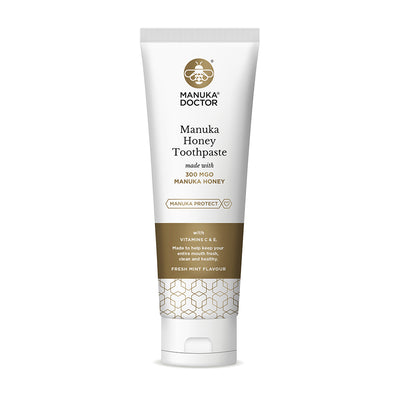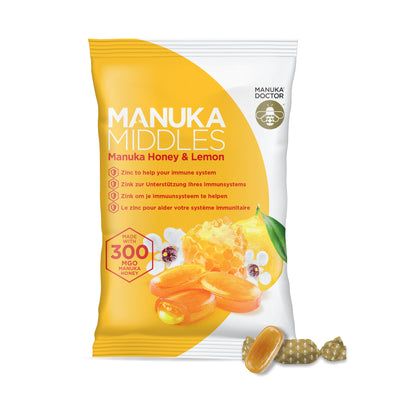Recently a lot of people have been asking us about using Manuka honey to help with their oral health. While many are aware of the benefits of Manuka Honey for coughs, immunity, gut health and overall wellness, the benefits for oral health are not as well known.
The premise is quite straightforward when you think about it. Manuka honey contains anti-bacterial properties thanks to having high levels of MGO.
… and if Manuka has the ability to kill bad bugs, then it will be well placed to help your oral health - where bugs and bacteria can be very prevalent in the mouth.
But how can you help improve your oral health? And what role does Manuka honey play?
Pharmacist Gemma Fromage is here to explain:
“Although the idea of consuming honey for good oral health may seem counterintuitive, unlike sweets and other refined sugars, manuka honey’s potent antibacterial effects make it unlikely to contribute to cavities or tooth decay" says Gemma.
Indeed, studies in the Swiss Dental Journal and Oral Health have shown manuka honey, with its high antibacterial activity, both attacks and inhibits the growth of harmful oral bacteria like P. gingivalis and A. actinomycetemcomitans associated with plaque formation, gum inflammation and gingivitis and tooth decay.
One further study examined the effects of chewing or sucking on a manuka honey product three times a day on the reduction of plaque and gingivitis. The group who used the manuka honey showed a significant reduction in plaque and gingival bleeding, compared to those who chewed the sugar-free gum.
What other natural ingredients can help oral health?
Vitamin C
A study published in the journal BMC Microbiology showed that vitamin C can play a vital role in preventing the development of dental caries or in other words, tooth decay [1]. Vitamin C also contributes to collagen synthesis, which is important for providing tooth structure, support, and maintenance [2,3]. There is scientific evidence linking periodontal disease and vitamin C deficiency [4,5].
Clinical studies have also found that vitamin C depletion can cause gingival bleeding regardless of oral hygiene [6]. Vitamin C reduces the inflammation reaction in periodontal disease, and the administration of vitamin C supplements has been shown to improve periodontal conditions [7]. The periodontal healing activity is attributed to the antioxidant activity of vitamin C, and its role in collagen biosynthesis that facilitates wound healing [7]. A vitamin C deficiency can result in scurvy which commonly manifests with bleeding gums and increased tooth mobility due to weakened collagen [8].
Vitamin E
Vitamin E, an essential nutrient in your diet, might prove beneficial in helping to control the development or progression of periodontal disease through its ability to prevent inflammation. Chronic inflammation plays an important role in some cases of periodontal disease. Over time, gingival inflammation causes a recession of gum tissue, and promotes the formation of ulcers, while inflammation of the ligaments or bone leads to tooth loosening or loss. Vitamin E can help to reduce the levels of inflammation in your body, potentially helping to control the chronic inflammation that can occur in periodontal disease.
Vitamin E is also an antioxidant; it prevents the activity of harmful free radicals, which oxidize and damage your tissues. The presence of antioxidants in your mouth can damage your gum tissue, helping promote the development of periodontal disease. A study published in "Advances in Medical Science" in 2007 found that epilepsy patients with periodontal disease displayed abnormally low levels of vitamin E -- as well as other antioxidants -- in their mouths and saliva. As a result, consuming vitamin E might help to restore vitamin E levels in and around gum tissue, potentially helping to treat or prevent periodontal disease in some individuals.
Dentists agree - try Manuka Honey for Oral Health
Celebrity Dentist to the stars Dr Surina Sehgal gave us a lovely review of our high MGO Manuka this month.
Surina runs a social media platform called ‘The Foodie Dentist’. A platform designed to educate the general public about oral health and prevention, nutrition and lifestyle, and how all these factors affect oral health
How can you help support your oral health with Manuka honey?
Manuka Doctor’s new Manuka Honey Toothpaste includes both Manuka Honey, Vitamin C and Vitamin E.
With a fresh mint flavour to keep your entire mouth fresh, clean and healthy and maximum fluoride –a safe naturally occurring mineral that is proven to be the most effective way of protecting teeth from decay.
Customers are already enjoying this new product, with reviews including this from Carolyn M:
“Very good value for money. Excellent packaging and will buy again. Calms your gums down straight away. Very fresh in your mouth. You can taste the mint. Soothing for me as I have sore gums, and they are feeling better each time I use the toothpaste. Excellent buy, wish I had found out about it years ago. Better late than never.”




